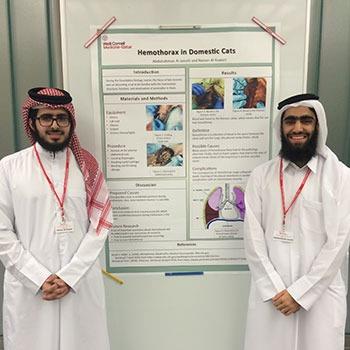Foundation students get hands-on research experience
 Nasser Al-Kuwari, left, and Abdulrahman Al-Jenahi.
Nasser Al-Kuwari, left, and Abdulrahman Al-Jenahi.
Foundation students have presented some of the findings of their long-term research projects as posters at the Foundation Program Research Forum.
The students spent the past four months of their biology classes learning embryology, anatomy and physiology, pathology, laboratory procedures and how to accurately record and report data by conducting dissections of feline specimens. The project culminated with a written report, from which the most interesting findings were presented to their fellow students, faculty and staff in the form of posters at a public research forum held at the college.
Working in pairs, the students conducted in-depth examinations of the structure of the felines and attempted to identify various pathologies to determine the conditions of each animal’s life, such as whether it had been a stray, had suffered malnutrition or mistreatment or had lived comfortably as a well-loved pet.
Students Nasser Al-Kuwari and Abdulrahman Al-Janahi presented their research, in which they discovered an accumulation of blood in the pleural cavity, the space between the chest wall and the lungs.
Nasser said:
“Working on a real specimen gave us a far better appreciation of anatomy than we would have got from a textbook. I also think that dissecting an animal and seeing its structure improved my understanding of human anatomy because we could compare and contrast the two.”
Abdulrahman said:
“I think we also gained a lot from conducting our own investigations. Working with your hands teaches you manual dexterity and it also helps to make the information you learn more memorable because you have seen and touched it in real life.”
Other projects discovered pathologies such as a gastrointestinal blockage, the presence of helminth parasites (worms) in the stomach of the animal, and evidence of lymphadenopathy (inflamed lymph nodes). In total, 18 students presented nine research projects.
Senior lecturer in biology Dr. Clare McVeigh said:
“The strength of this type of inquiry-based learning project is that it requires the students to work independently and think critically. Each specimen was different, with different pathologies, so the students had to make detailed observations and then apply their knowledge to form their own conclusions, which is very different from simply learning some information and then reproducing it at a later date.
“It really challenged the students and they responded extremely well, which you can see by the quality of their posters.”